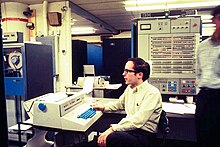This article includes a list of general references, but it lacks sufficient corresponding inline citations. (August 2010) |
| Developer | IBM |
|---|---|
| Working state | Discontinued |
| Source model | Source available |
| Initial release | 1967 |
| Available in | English |
| Platforms | System/360 Model 67, System/370 models with DAT |
| Default user interface | Command-line interface |
| License | TSS/360: free TSS/370: Proprietary |
| History of IBM mainframe operating systems |
|---|

The IBM Time Sharing System TSS/360 is a discontinued early time-sharing operating system designed exclusively for a special model of the System/360 line of mainframes, the Model 67. Made available on a trial basis to a limited set of customers in 1967, it was never officially released as a supported product by IBM. TSS pioneered a number of novel features, some of which later appeared in more popular systems such as MVS. TSS was migrated to System/370 and 303x systems, but despite its many advances and novel capabilities, TSS failed to meet expectations and was eventually canceled. The Resident Supervisor of TSS/370 was used as the basis for a port of UNIX to the IBM mainframe.[1] TSS/360 also inspired the development of the TSS/8 operating system.[2]
- ^ Felton, W. A.; Miller, G. L.; Milner, J. M. (October 1984). "The UNIX System : A UNIX System Implementation for System/370". AT&T Bell Laboratories Technical Journal. 63 (8): 1751–1767. doi:10.1002/j.1538-7305.1984.tb00063.x. S2CID 7425099.
- ^ C. Gordon Bell; J. Craig Mudge; John E. McNamara (12 May 2014). Computer Engineering: A DEC View of Hardware Systems Design. Elsevier Science. p. 180. ISBN 978-1-4832-2110-6.
TSS/8 was designed at Carnegie-Mellon University with graduate student Adrian van de Goor, in reaction to the cost, performance, reliability, and complexity of IBM's TSS/360 (for their Model 67). Although the TSS/360 was not marketed, it eventually worked and contributed some ideas and trained thousands for IBM. At Carnegie-Mellon (CMU), a TSS/8 operated until 1974 when the special swapping disk expired. The cost per user or per job tended to be about 1/20 of the TSS/360 system CMU ran.
